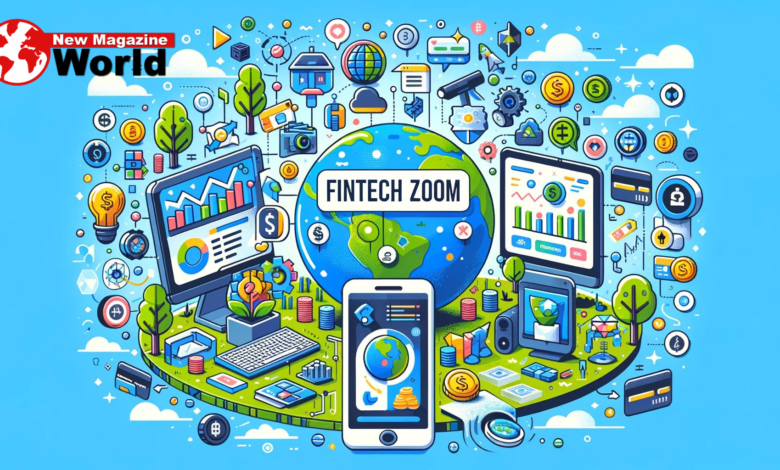Fintech Zoom: Revolutionizing the Financial Technology Landscape

In today’s rapidly evolving digital economy, the term Fintech Zoom has gained prominence as it reflects the accelerating pace at which financial technology (fintech) is transforming traditional financial services. This comprehensive article delves into the concept of Fintech Zoom, its implications for the industry, and how it’s shaping the future of finance.
What is Fintech Zoom?
Fintech Zoom refers to the rapid growth and expansion of financial technology companies and innovations that are revolutionizing the financial services industry. This phenomenon encompasses various aspects, including advancements in digital payments, blockchain technology, robo-advisors, and peer-to-peer lending platforms. The term captures the swift and dynamic nature of these changes, highlighting how fintech is rapidly evolving and gaining momentum.
The Rise of Fintech: A Historical Overview
The fintech industry has undergone significant evolution over the past few decades. The term “financial technology” itself is relatively new, but the roots of fintech can be traced back to the early days of electronic banking and automated teller machines (ATMs). However, it wasn’t until the advent of the internet and mobile technology that fintech truly began to gain traction.
The 2008 financial crisis acted as a catalyst for fintech innovation. In the wake of the crisis, there was a growing demand for more transparent, efficient, and accessible financial services. This led to the emergence of startups and technology-driven solutions aimed at addressing the shortcomings of traditional financial institutions.
Key Drivers Behind Fintech Zoom
Several factors contribute to the rapid growth of fintech and the concept of Fintech Zoom. These include:
Technological Advancements
Technological advancements play a crucial role in driving fintech innovation. The rise of cloud computing, artificial intelligence (AI), machine learning, and big data analytics has enabled fintech companies to offer sophisticated and personalized financial solutions. For example, AI-powered algorithms can analyze vast amounts of data to provide tailored investment advice or detect fraudulent activities in real-time.
Changing Consumer Expectations
Today’s consumers expect seamless and convenient financial services. They demand quick and easy access to their accounts, instant payments, and personalized financial advice. Fintech companies have responded to these demands by developing user-friendly apps and platforms that offer a range of services, from mobile banking to investment management.
Regulatory Support
Governments and regulatory bodies have recognized the potential of fintech to enhance financial inclusion and drive economic growth. Many countries have introduced supportive regulations and frameworks to foster innovation in the fintech sector. For instance, regulatory sandboxes allow fintech companies to test their products and services in a controlled environment before launching them to the broader market.
Fintech Zoom and Its Impact on Traditional Financial Institutions
The rise of fintech has had a profound impact on traditional financial institutions. Banks and other financial organizations have had to adapt to the changing landscape or risk becoming obsolete. Some of the key ways in which fintech Zoom is influencing traditional finance include:
Disruption of Traditional Banking Models
Fintech companies have introduced new business models that challenge traditional banking practices. For example, digital-only banks, also known as neobanks, operate without physical branches and offer lower fees and more innovative services compared to traditional banks. This disruption has forced established banks to rethink their strategies and invest in digital transformation.
Increased Competition
The influx of fintech startups has intensified competition in the financial services industry. Traditional financial institutions are now competing with agile fintech companies that offer innovative solutions and better customer experiences. This competition has led to improved services and lower costs for consumers.
Collaboration and Partnerships
Rather than viewing fintech as a threat, many traditional financial institutions have chosen to collaborate with fintech companies. Partnerships and acquisitions have become common strategies for established banks to leverage fintech innovations and enhance their service offerings. These collaborations enable banks to integrate new technologies and stay relevant in a rapidly evolving market.
Notable Fintech Zoom Innovations
Several innovations exemplify the concept of Fintech Zoom and its transformative impact on the financial industry. Some of the most notable innovations include:
Digital Payments and Mobile Wallets
Digital payment solutions and mobile wallets have revolutionized the way consumers make transactions. Services like Apple Pay, Google Wallet, and Samsung Pay allow users to make payments using their smartphones, eliminating the need for physical cash or cards. These innovations have made transactions faster, more secure, and more convenient.
Blockchain and Cryptocurrencies
Blockchain technology, the underlying infrastructure of cryptocurrencies like Bitcoin and Ethereum, has introduced new possibilities for secure and transparent transactions. Blockchain’s decentralized nature reduces the need for intermediaries, making transactions more efficient and cost-effective. Additionally, cryptocurrencies have gained popularity as alternative investment assets and means of transferring value.
Robo-Advisors
Robo-advisors are automated platforms that provide investment advice and portfolio management services using algorithms. These platforms offer personalized investment strategies based on individual goals and risk tolerance, often at a lower cost than traditional financial advisors. Robo-advisors have democratized access to investment management services and made investing more accessible to a broader audience.
Peer-to-Peer Lending
Peer-to-peer (P2P) lending platforms connect borrowers directly with individual investors, bypassing traditional financial institutions. These platforms offer an alternative to conventional lending and borrowing, often with lower interest rates and more flexible terms. P2P lending has opened up new opportunities for both borrowers and investors.
The Future of Fintech Zoom
As fintech continues to evolve, several trends and developments are likely to shape the future of Fintech Zoom:
Integration of Artificial Intelligence
AI and machine learning will play an increasingly important role in fintech. AI-powered tools will enhance fraud detection, improve customer service through chatbots, and provide more accurate financial predictions. The integration of AI will enable fintech companies to offer even more personalized and efficient services.
Growth of Decentralized Finance (DeFi)
Decentralized finance (DeFi) is an emerging trend that leverages blockchain technology to create open and permissionless financial systems. DeFi platforms aim to provide traditional financial services, such as lending and trading, without the need for intermediaries. The growth of DeFi could further disrupt traditional finance and expand access to financial services globally.
Enhanced Focus on Security and Privacy
With the increasing reliance on digital financial services, security and privacy will remain top priorities. Fintech companies will need to invest in robust security measures to protect user data and prevent cyberattacks. Additionally, regulatory requirements related to data privacy and security will continue to evolve.
Expansion into Emerging Markets
Fintech Zoom is likely to drive growth in emerging markets where access to traditional financial services is limited. Fintech solutions can provide financial inclusion to underserved populations and support economic development in these regions. As technology infrastructure improves, fintech companies will have more opportunities to expand into new markets.
Conclusion
Fintech Zoom represents the rapid and transformative growth of financial technology, reshaping the financial services industry in unprecedented ways. Driven by technological advancements, changing consumer expectations, and supportive regulatory environments, fintech innovations are challenging traditional financial institutions and creating new opportunities for consumers and businesses alike. As fintech continues to evolve, the future holds exciting possibilities for further disruption, innovation, and expansion in the global financial landscape.





